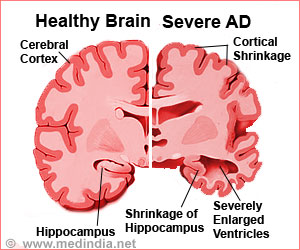Healthy adults who participated in cognitive training demonstrated positive changes in executive brain function as well as increase in global brain flow.

‘Healthy adults who participated in cognitive training demonstrated positive changes in executive brain function as well as a 7.9 percent increase in global brain flow.’





"Many adults without dementia experience slow, continuous and significant age-related changes in the brain, specifically in the areas of memory and executive function, such as planning and problem-solving," said Dr. Sandra Bond Chapman, study lead author, founder and chief director of the Center for BrainHealth, and Dee Wyly Distinguished University Professor. "We can lose 1-2 percent in global brain blood flow every decade, starting in our 20s. To see almost an 8 percent increase in brain blood flow in the cognitive training group may be seen as regaining decades of brain health since blood flow is linked to neural health." For the study, 36 sedentary adults ages 56-75 years were randomized into either a cognitive training or a physical training group. Each group took part in training three hours per week over 12 weeks. Neurocognitive, physiological, and MRI data were taken before, during and after training. The cognitive group received Strategic Memory Advanced Reasoning Training (SMART), a manualized brain training developed at the Center for BrainHealth. The strategy-based training focuses on three executive functions: strategic attention (prioritizing brain resources); integrative reasoning (synthesizing information at a deeper level); and innovation (encouraging fluid thinking, diverse perspective-taking, and problem solving). The physical training group completed three, 60-minute sessions per week that included five minutes of warmup and cool down with 50 minutes of either walking on a treadmill or cycling on a stationary bike while maintaining 50-75 percent of maximum heart rate.
"Most people tell me that they want a better memory and notice memory changes as they get older," said Dr. Mark D'Esposito, study co-author and professor of neuroscience and psychology, and director of the Henry H. Wheeler Jr. Brain Imaging Center at the Helen Wills Neuroscience Institute at the University of California, Berkeley. "While memory is important, executive functions such as decision-making and the ability to synthesize information are equally, if not more so, but we often take them for granted. The takeaway: Aerobic activity and reasoning training are both valuable tools that give your brain a boost in different ways."
The research team attributes the global cerebral blood flow gains to concerted mental effort during the reasoning training. "We believe the reasoning training triggered neural plasticity by engaging the brain networks involved in staying focused on a goal, such as writing a brief business proposal, while continuously adapting to new information, such as feedback from a collaborator," Chapman said.
The aerobic exercise group did not show significant global blood flow gains, however the exercisers with improved memory performance showed higher cerebral blood flow in the bilateral hippocampi, an area underlying memory function and particularly vulnerable to aging and dementia.
Advertisement
Dr. Laura DeFina, chief executive officer of The Cooper Institute in Dallas and collaborator on the study, says the findings are encouraging.
Advertisement
Source-Eurekalert















